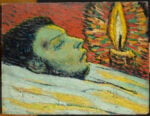Laia Abril – On Abortion
.jpg)
Oggi esistono mezzi sicuri ed efficaci per effettuare un aborto, ma ogni anno muoiono 47.000 donne a causa di aborti falliti. Il progetto di Aia Abril On Abortion documenta e concettualizza questi pericoli e danni causati dalla mancanza di accesso legale, sicuro e gratuito all’aborto da parte delle donne.
Comunicato stampa
Inline-Bild 2
© Hippocratic betrayal and obstetric violence. On February 2015, a 19-year-old pregnant woman ingested abortive pills in São Bernardo do Campo, Brazil. She started feeling abdominal pains, so her aunt took her to hospital. After she was treated, her doctor called the police, saying he would autopsy the fetus if she did not confess to trying to abort. She was handcuffed to her hospital bed, and freed only after paying a 250€ bail.Denunciation by doctors is not uncommon in Brazil, Peru or El Salvador. Women who are reported for attempting abortion can be detained in hospitals for weeks or months. Many doctors claim they are legally required to notify authorities when they suspect an abortion, in contradiction of professional codes of doctor-patient confidentiality. Note: photographic reconstruction. Laia Abril.
de
Heute gibt es sichere und effiziente Abtreibungsmöglichkeiten, doch jedes Jahr sterben 47.000 Frauen an verpfuschten Abtreibungen. Laia Abrils Projekt On Abortion dokumentiert und konzeptualisiert diese Gefahren und Schäden, die durch den fehlenden legalen, sicheren und freien Zugang von Frauen zu Abtreibungen verursacht werden. Während Abril ihr Netz von Fragen um Ethik und Moral webt, kreiert sie auch eine Reihe von meditativen visuellen und textlichen Manifestationen der sozialen Auslöser, Stigmata und Tabus um die Abtreibung, die bis heute unsichtbar geblieben sind. On Abortion ist das erste Kapitel von Abrils neuem Langzeitprojekt A History of Misogyny - visuelle Forschung, die durch historische und zeitgenössische Vergleiche durchgeführt wurde - eine Ausstellung in Les Rencontres d'Arles im Jahr 2016 und ein Buch, das 2017 von Dewi Lewis veröffentlicht wurde.
it
Oggi esistono mezzi sicuri ed efficaci per effettuare un aborto, ma ogni anno muoiono 47.000 donne a causa di aborti falliti. Il progetto di Aia Abril On Abortion documenta e concettualizza questi pericoli e danni causati dalla mancanza di accesso legale, sicuro e gratuito all'aborto da parte delle donne. Mentre intreccia la sua rete di domande sull'etica e la moralità, Abril crea anche una serie di manifestazioni meditative visive e testuali degli inneschi sociali, degli stigmi e dei tabù sull'aborto che sono rimasti invisibili fino ad ora. On Abortion è il primo capitolo del nuovo progetto a lungo termine di Abril A History of Misogyny - ricerca visiva intrapresa attraverso confronti storici e contemporanei - è stata una mostra a Les Rencontres d'Arles nel 2016 e un libro, pubblicato da Dewi Lewis nel 2017.
en
Today, safe and efficient means of abortion exist, yet 47,000 women die due to botched abortions, every year. Laia Abril's project On Abortion documents and conceptualizes these dangers and damages caused by women's lack of legal, safe and free access to abortion. As she weaves her net of questions around ethics and morality, Abril also creates a series of meditative visual and textual manifestations of the social triggers, stigmas, and taboos around abortion that have remained invisible until now. On Abortion is the first chapter of Abril’s new long-term project A History of Misogyny - visual research undertaken through historical and contemporary comparisons – was an exhibition at Les Rencontres d'Arles in 2016 and a book, published by Dewi Lewis in 2017.



